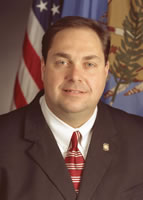In order to provide equal access and equal opportunity to people with diverse abilities, this site has been designed with accessibility in mind. Click here to view
Momentum, Editorial Support Grows for “Nick’s Law”
 Sen. Jay Paul Gumm
Sen. Jay Paul Gumm
While the legislative session will not get into full swing until February, momentum is already building for Senate Bill 1, also known “Nick’s Law.” The legislation would require health insurance companies to cover diagnosis and treatment of autism in children.
“I continue to hear from more families and child advocates who know this bill is the right thing to do,” said Senator Jay Paul Gumm, author of Nick’s Law. “Since the legislation was first introduced, we’ve seen a growing number of newspapers throughout the state voice editorial support for the measure.”
Autism is the fastest growing developmental disability in the United States, affecting one in every 150 children. Recent editorials, news reports and scholarly studies on the issue have pointed to the financial devastation caused to families after their insurance companies have refused to cover autism diagnosis and treatment.
To date, newspapers in Enid, Claremore, Edmond and Tulsa are among those that have published editorials expressing support for Nick’s Law. This week, even The Daily Oklahoman – which has been critical of Nick’s Law – wrote in an editorial that the “bill will be hard to stop.”
In 2008, the measure repeatedly passed the Oklahoma Senate with bipartisan support. Gumm, a Democrat from Durant, said there was bipartisan support in the House of Representatives, as well. A small group of House Republicans, led by now-former Rep. Ron Peterson worked to prevent even a vote on the bill.
“I’ve said it repeatedly: Autism strikes families from all walks of life, families from both political parties,” he said. “Conservative Republican lawmakers in other states have written, fought for and passed similar legislation. High-profile Republican governors already being talked about as presidential candidates have signed into law similar legislation.”
Gumm said Oklahoma’s families do not care who gets credit for passing Nick’s Law, they just want to see it become Oklahoma’s law. “I will be the first in line to give all the credit in the world to lawmakers of either party who will stand up for these families who are suffering,” he said.
In a national Associated Press story by medical writer Lindsey Tanner, a study published in the American Academy of Pediatrics magazine was detailed. The study documents the challenges faced by families with autistic children.
According to the story, these families endure health care costs that put “unprecedented financial strain” on families. Further, the report notes that when compared with parents of children with chronic health care needs other than autism, those with autistic children are three times more likely to have quit jobs or cut back on work hours to care for their children.
These families pay more for their children’s health care, spend more time providing or arranging for that care and are more likely to have financial challenges. Lost wages and high health care costs compound the struggles of these families, often leading to divorce.
“Every shred of evidence points to the fact that bills like Nick’s Law do make a huge difference in the lives of these children and their families and are unquestionably ‘pro-family,’” Gumm said. “This bill is not a complete solution – no one has claimed it is – but it is the foundation on which we can build while ultimately saving taxpayers’ dollars.
“To do nothing, is to condemn these children to a lifetime locked behind the walls of autism. To do nothing condemns these parents to a lifetime of unprecedented financial struggles. To do nothing condemns taxpayers to eventually picking up the tab. To do nothing is unconscionable.”
 Oklahoma Senate
Oklahoma Senate

